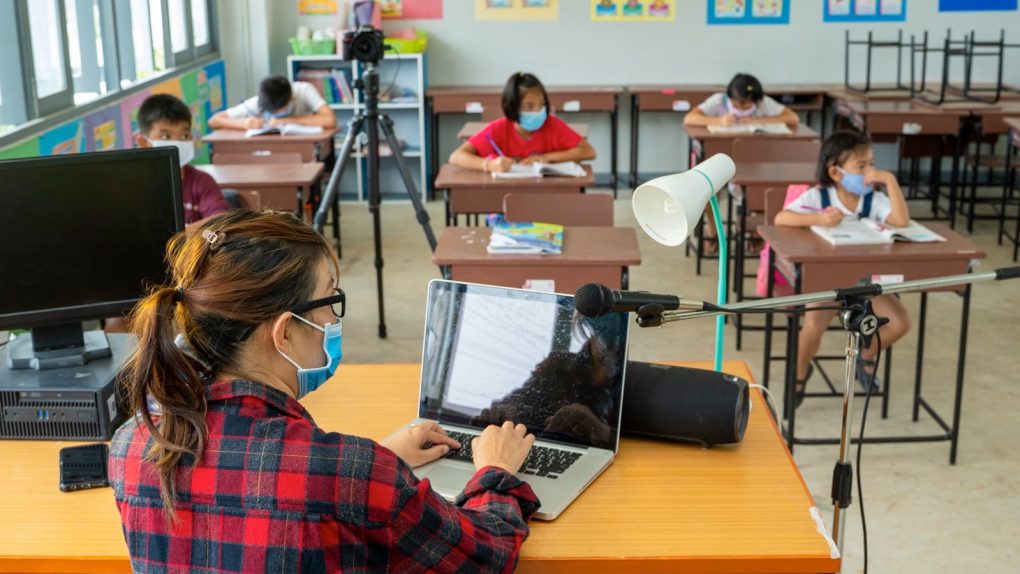- Children might spread the coronavirus without even knowing they have it, especially in communities where health officials do not routinely screen for asymptomatic carriers or trace contacts.
- That’s the conclusion of a new study from South Korea that looked at asymptomatic, presymptomatic, and symptomatic children who were infected with COVID-19.
- The researchers said some COVID-19 symptoms were not recognized and the illness may have been missed. They also found that the children can carry the virus for weeks and that some children experienced symptoms for more than a month.
The number of children who have been confirmed COVID-19-positive has been gradually increasing since schools began to reopen. A variety of reports have so far detailed the various failures and safety inconsistencies in schools, which suggest that more work is needed to ensure the safety of children, their families, and faculty members. Separately, a variety of studies have brought forward new conclusions about coronavirus cases in children. Research has shown that kids can develop high viral loads, even as young as kindergarten-age. That doesn’t necessarily mean they’re more infectious, but more virus in the upper airways is often a transmission risk factor.
On the other hand, a different paper said that children might be just as infectious as adults. Other studies concluded that most children do not risk developing life-threatening complications like adults, and that kids with preexisting conditions are more likely to develop a more severe course of the illness. Even still, exceptions exist and there are well-documented records of deaths in young patients with no other medical conditions. The latest piece of the coronavirus puzzle in children comes from a country that had one of the best responses to the pandemic. Researchers in South Korea have found that children can carry the virus for weeks, regardless of whether or not they develop symptoms. That further increases the risk of silent transmission in the community, especially if measures aren’t taken to detect COVID-19 cases early.
Published in JAMA Pediatrics, the study offers data on 91 COVID-19-positive children who were observed between February 18th and March 31st. 20 of them did not show any symptoms and remained asymptomatic for the entire course of the study. Another 18 were presymptomatic, but eventually developed symptoms. The rest of them — 71 children — did develop symptoms that are usually seen in COVID-19 patients, including fever, cough, diarrhea, abdominal pain, and the sudden loss of taste and smell.
The researchers found that the duration of the symptoms ranged from one to 36 days, which is troubling not just because of the risk of coronavirus spread, but also because a child might have to deal with these symptoms as long as many adults do.
What’s even more troubling is that most of the symptomatic children were not correctly diagnosed when symptoms first appeared. Only 8.5% of patients were confirmed to be infected with the novel coronavirus when symptoms started showing. The majority (66.2%) had symptoms that went unrecognized.
“The major hurdle implicated in this study in diagnosing and treating children with COVID-19 is that a considerable number of children are asymptomatic, and even if symptoms are present, they are unrecognized and overlooked before COVID-19 is diagnosed,” the researchers wrote. “Approximately 52% of the children already had symptoms a median of 3 days prior to diagnosis. Given the very tight surveillance in Korea, it is notable that the symptoms of 70% of them, who had close contact with people with confirmed cases and were assumed to be in self-quarantine, were not recognized. Children in quarantine were tested for COVID-19 the day before they were released to confirm that they did not have the disease.”
The researchers say that 93% of the children with COVID-19 might have been missed “were it not for Korea’s intensive contact tracing and aggressive diagnostic testing.” Other countries like the US have not been able to implement efficient contact tracing and testing campaigns. The US CDC recently made a controversial change to its guidelines to tell people who think they may have been exposed to COVID-19 that testing isn’t necessary. It’s important to note that while more research is required on the matter, such a study isn’t even possible in countries that do not have such strong containment protocols in place. Again, like the US.
The researchers also said that it’s “alarming” that virus RNA can be detected in samples from asymptomatic children for an average of 14.1 days. The overall average for all the children in the study was even higher, at 17.6 days. That means kids who experience symptoms might carry traces of the virus for even longer than asymptomatics. The children are not likely to be contagious for the entire period, and viral RNA detection doesn’t mean the kids still had viable virus in them. The researchers say that infectiousness could peak 2 to 3 days before the symptoms start, and that transmission during the presymptomatic stage of the illness could account for up to 44% of secondary infections.
Of note, if that viral RNA is “proven infectious (because most of the children were asymptomatic, were presymptomatic, or had unrecognizable symptoms in this study), the transmission potential of SARS-CoV-2 in children and its effect on the community might be greater than expected,” the researchers said.
The Children’s National Hospital’s Dr. Roberta DeBiasi and Dr. Meghan Delaney wrote an accompanying article that highlights the findings of the South Korea research, stressing the importance of proper testing and of observing safety measures as schools reopen. “A surveillance strategy that tests only symptomatic children will fail to identify children who are silently shedding virus while moving about their community and schools. In regions where use of face masks is not widely accepted or used by the general public, asymptomatic carriers may serve as an important reservoir that may facilitate silent spread through a community,” the doctors said.








